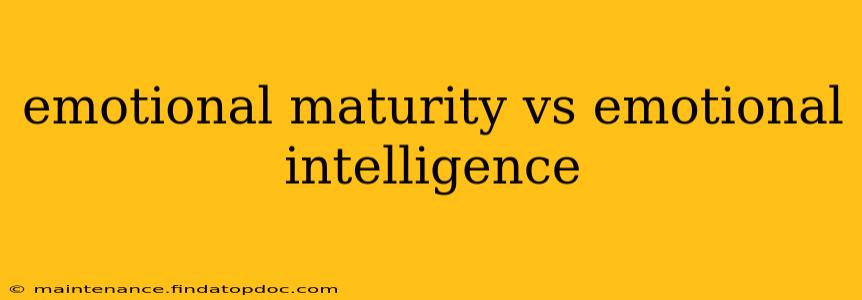Emotional maturity and emotional intelligence (EQ) are often used interchangeably, but they represent distinct, albeit related, concepts. While both contribute to healthy relationships and success in life, understanding their differences is crucial for personal growth. This article delves into the nuances of each, clarifying their unique characteristics and highlighting how they work together.
What is Emotional Maturity?
Emotional maturity refers to the ability to manage your emotions effectively, particularly in challenging situations. It's about possessing a developed sense of self-awareness, understanding your emotional triggers, and responding in constructive ways rather than impulsively. A mature individual takes responsibility for their feelings, avoids blaming others, and handles conflict with grace and understanding. It's a journey of growth and development, not a destination.
Key characteristics of emotional maturity include:
- Self-awareness: Recognizing and understanding your own emotions and their impact on yourself and others.
- Self-regulation: Managing your emotions effectively, even under pressure. This involves controlling impulses and avoiding emotional outbursts.
- Responsibility: Taking ownership of your feelings and actions, and avoiding blaming others for your emotional state.
- Resilience: Bouncing back from setbacks and disappointments, learning from mistakes, and maintaining a positive outlook.
- Empathy (but not necessarily the core): While empathy is valuable, emotional maturity focuses more on self-management before extending understanding to others.
What is Emotional Intelligence (EQ)?
Emotional intelligence is a broader concept encompassing emotional maturity but extending beyond it. EQ involves not only managing your own emotions but also understanding and responding to the emotions of others. It's about building strong relationships, navigating social situations skillfully, and using emotional information to guide your decisions.
Key components of EQ include:
- Self-awareness: Understanding your own emotions, strengths, weaknesses, drives, values, and their impact on others.
- Self-regulation: Managing your emotional reactions, controlling impulses, and thinking before acting.
- Motivation: Being driven, optimistic, and committed to your goals.
- Empathy: Understanding and sharing the feelings of others.
- Social skills: Building and maintaining positive relationships, communicating effectively, and managing conflict constructively.
How Do Emotional Maturity and EQ Differ?
The primary difference lies in the focus. Emotional maturity emphasizes self-management, focusing on individual emotional regulation and responsibility. Emotional intelligence incorporates self-management but adds social awareness and the ability to navigate interpersonal dynamics effectively. You can be emotionally mature without being highly emotionally intelligent, but high EQ usually incorporates a significant degree of emotional maturity. Think of emotional maturity as a foundational element of emotional intelligence.
What are the benefits of emotional maturity?
Developing emotional maturity leads to a more fulfilling and successful life. Benefits include:
- Improved relationships: Better communication and conflict resolution skills.
- Reduced stress and anxiety: Greater self-control and resilience to life's challenges.
- Increased self-esteem: Taking responsibility for your emotions fosters confidence and self-acceptance.
- Greater job satisfaction: Improved ability to navigate workplace dynamics and handle stress.
What are the benefits of high emotional intelligence?
High EQ offers advantages in various aspects of life:
- Stronger relationships: Building deeper connections with others through empathy and understanding.
- Effective leadership: Inspiring and motivating others by understanding their needs and perspectives.
- Improved communication: Expressing yourself clearly and effectively, fostering mutual understanding.
- Increased success in career: Better teamwork, conflict resolution, and leadership skills.
How to Improve Emotional Maturity and EQ?
Developing both requires conscious effort and practice. Strategies include:
- Mindfulness: Paying attention to your thoughts and feelings without judgment.
- Self-reflection: Regularly examining your emotional responses and behaviors.
- Seeking feedback: Asking others for honest feedback on your interactions.
- Developing empathy: Actively trying to understand others' perspectives and feelings.
- Practicing self-compassion: Treating yourself with kindness and understanding, especially during difficult times.
Is it possible to have one without the other?
While highly interconnected, it's theoretically possible to possess one without the other. Someone might exhibit strong self-regulation and responsibility (emotional maturity) but lack the social skills to effectively navigate complex interpersonal relationships (lower EQ). Conversely, someone might excel at understanding others' emotions (high empathy, part of EQ) but struggle with their own emotional regulation (lower emotional maturity). However, the ideal scenario involves a high degree of both emotional maturity and emotional intelligence for a well-rounded and successful life.
This detailed exploration should help clarify the distinctions between emotional maturity and emotional intelligence, emphasizing their interrelation and individual importance for personal growth and well-being.
